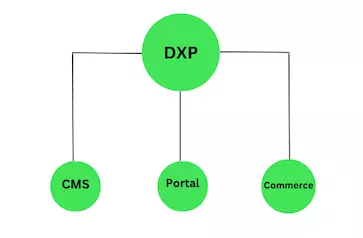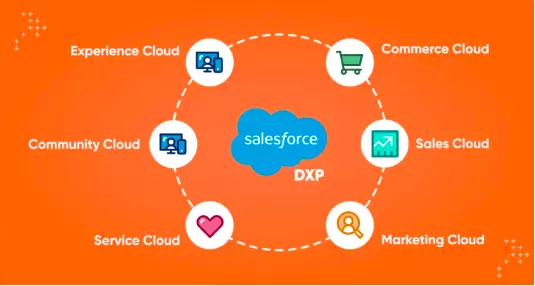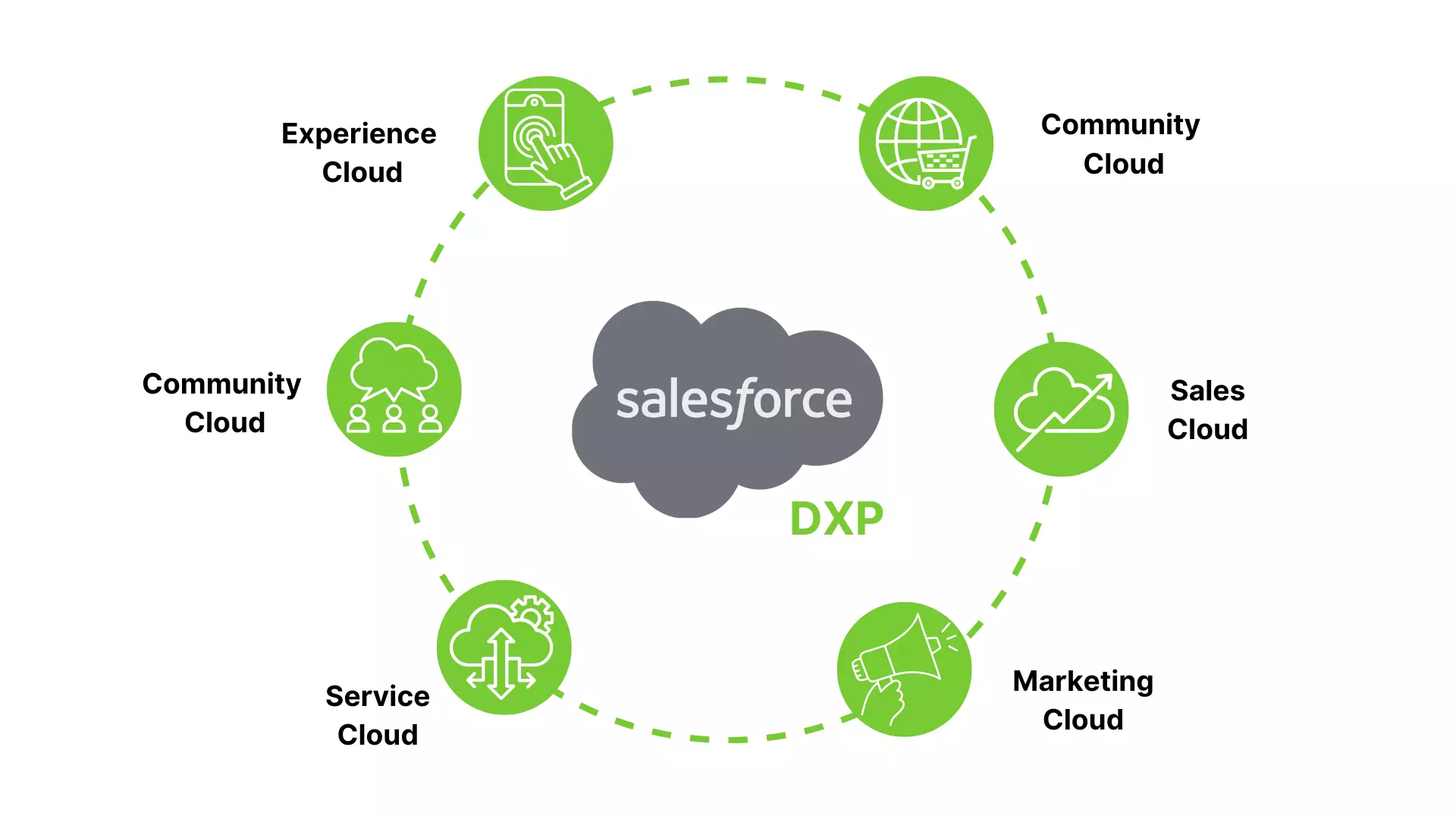Digital Experience Platform
Definition
A Digital Experience Platform (DXP) is a software solution that enables businesses to deliver a seamless, personalised digital experience across multiple channels and touchpoints.
Description
A digital experience platform is a powerful tool for businesses that want to create a cohesive, personalised digital experience for their customers. By combining a range of tools and capabilities into a single platform, a DXP can help businesses manage their digital content, data, and interactions more effectively, ultimately improving customer engagement and driving business growth.

Brands can create and manage a seamless, personalised digital experience for their customers across multiple channels and touchpoints regardless of how they interact with a company’s digital presence.
Importance of Digital Experience Platform
Digital experience platforms (DXPs) are becoming increasingly crucial for businesses in today’s digital age. Here are some of the key reasons why:
- Improved customer engagement: DXPs enable businesses to deliver customers a seamless, personalised digital experience across multiple channels and touchpoints. By providing a cohesive and consistent experience, businesses can improve customer engagement and satisfaction, increasing customer loyalty and retention.
- Increased efficiency: By combining various tools and capabilities into a single platform, DXPs enable businesses to manage their digital content, data, and interactions more efficiently. This can lead to cost savings and increased productivity, as companies can streamline their digital operations and reduce the need for multiple tools and systems.
- Data-driven insights: DXPs typically include analytics and personalization tools that enable businesses to analyse customer behaviour and preferences and personalise the customer experience based on this data. Businesses can optimise their marketing and sales strategies by leveraging data-driven insights and improving customer engagement and conversion rates.
- Agility and flexibility: DXPs enable businesses to quickly adapt to changing customer needs and market conditions. By providing a flexible and agile platform for managing digital content and interactions, businesses can respond more rapidly to new opportunities and challenges and stay ahead of the competition.
- Improved brand reputation: By providing a seamless and personalised digital experience, businesses can improve their brand reputation and standing in the market. This can increase customer loyalty and positive word-of-mouth and enhance business performance.
What are the components of Digital Experience Platform?
A DXP typically includes various tools and features that help businesses manage digital content, data, and customer interactions. Some of the critical components of a DXP include:
- Content management system (CMS): A CMS enables businesses to create and manage digital content, such as web pages, blogs, and product descriptions, in a centralised location.
- Customer relationship management (CRM) system: A CRM system helps businesses manage customer interactions, including customer data, sales leads, and customer support requests.
- Analytics and personalization tools: DXPs typically include tools for analysing customer behaviour and preferences and personalising the customer experience based on this data.
- Marketing automation: A DXP may also include tools for automating marketing tasks, such as email campaigns and social media posts.
- E-commerce capabilities: Many DXPs include features for managing online sales and transactions, such as shopping carts and payment processing.
How does a digital experience platform work?
A digital experience platform (DXP) works by bringing together a range of tools and capabilities into a single platform that enables businesses to create and manage a seamless, personalised digital experience for their customers across multiple channels and touchpoints.
At its core, a DXP typically includes a content management system (CMS) that enables businesses to create and manage digital content, such as web pages, blogs, and product descriptions, in a centralised location. This content can be quickly published across multiple channels, such as websites, mobile apps, social media, and other digital touchpoints.
In addition to the CMS, a DXP typically includes a range of other tools and features that help businesses manage their digital interactions with customers. These may include:
- Customer relationship management (CRM) system: A CRM system helps businesses manage customer interactions, including customer data, sales leads, and customer support requests.
- Analytics and personalization tools: DXPs typically include tools for analysing customer behaviour and preferences and personalising the customer experience based on this data.
- Marketing automation: A DXP may also include tools for automating marketing tasks, such as email campaigns and social media posts.
- E-commerce capabilities: Many DXPs include features for managing online sales and transactions, such as shopping carts and payment processing.
By bringing together all of these tools and capabilities into a single platform, a DXP enables businesses to manage their digital content, data, and interactions more efficiently and effectively. This can lead to improved customer engagement, efficiency, data-driven insights, agility and flexibility, and brand reputation.
A DXP is a powerful tool for businesses that want to create a cohesive, personalised digital experience for their customers across all digital touchpoints. Businesses can improve customer engagement and drive business growth over time by providing a centralised platform for managing all aspects of the digital customer experience.
Future Scope Of Digital Experience Platform
The future scope of Digital Experience Platforms (DXPs) is quite promising as businesses increasingly shift towards digital transformation. DXPs are becoming more critical for companies to enhance customer experiences, improve business processes, and drive growth.
Some of the future trends in DXPs are:
- Personalization: Customers demand personalised experiences, and DXPs enable businesses to deliver that by using data analytics and artificial intelligence to provide tailored content and recommendations.
- Omnichannel support: With customers interacting with businesses through multiple channels, DXPs must offer seamless integration across all touchpoints, from websites to social media platforms and mobile apps.
- Integration with emerging technologies: As emerging technologies such as the Internet of Things (IoT) and Augmented Reality (AR) become more prevalent, DXPs will need to integrate with these technologies to offer an immersive experience to customers.
- Security: Cybersecurity threats are a constant concern, and DXPs must offer robust security measures to protect customer data and prevent breaches.
- Low-code/no-code development: DXPs will increasingly offer low-code or no-code development options, allowing businesses to build custom digital experiences without extensive coding knowledge.
Example:
Salesforce offers a DXP that combines customer data, analytics, and content management to deliver personalised experiences across all touchpoints.

Source: https://www.axelerant.com/

It provides a comprehensive suite of tools for managing customer data, creating personalised experiences, and delivering content across multiple channels. With Salesforce’s DXP, businesses can build and customise digital experiences tailored to their customer’s needs and preferences.
The platform’s robust analytics capabilities enable enterprises to gain insights into their customers’ behaviour and preferences, allowing them to create targeted marketing campaigns and personalised experiences. The DXP tool is highly scalable and can accommodate businesses of all sizes, making it an ideal choice for enterprises looking to transform their digital presence. Salesforce’s DXP is a powerful tool that helps businesses enhance customer experiences and drive growth.
FAQs
What is a Digital Experience Platform (DXP)?
A Digital Experience Platform (DXP) is a software platform that combines content management, customer data management, and other digital experience tools to deliver personalised and engaging customer experiences across multiple channels.
What are the benefits of a DXP?
DXPs offer several benefits, including the ability to deliver personalised experiences, improve customer engagement and satisfaction, streamline business processes, and drive growth and revenue.
What features are included in a DXP?
Features in a DXP may vary but typically include content management, personalization tools, analytics and reporting, customer data management, social media integration, and marketing automation.
How do DXPs differ from traditional content management systems (CMS)?
While DXPs and CMSs manage digital content, DXPs offer a broader range of capabilities beyond content management, including personalization, customer data management, and marketing automation.
What types of businesses can benefit from a DXP?
DXPs can benefit businesses of all sizes and industries but are particularly useful for enterprises looking to enhance their digital presence and improve customer experiences across multiple channels.





We would love to have your opinion.